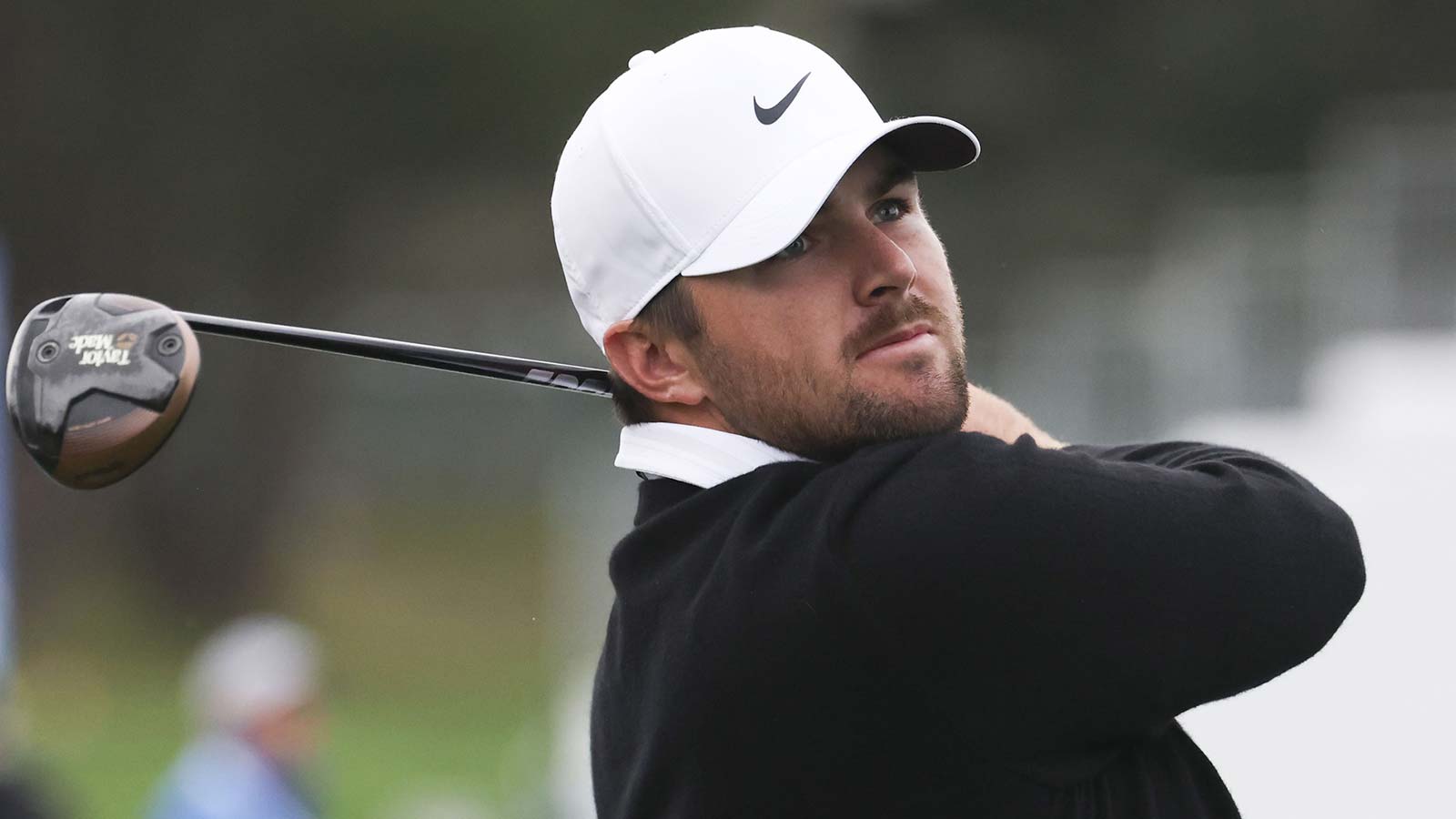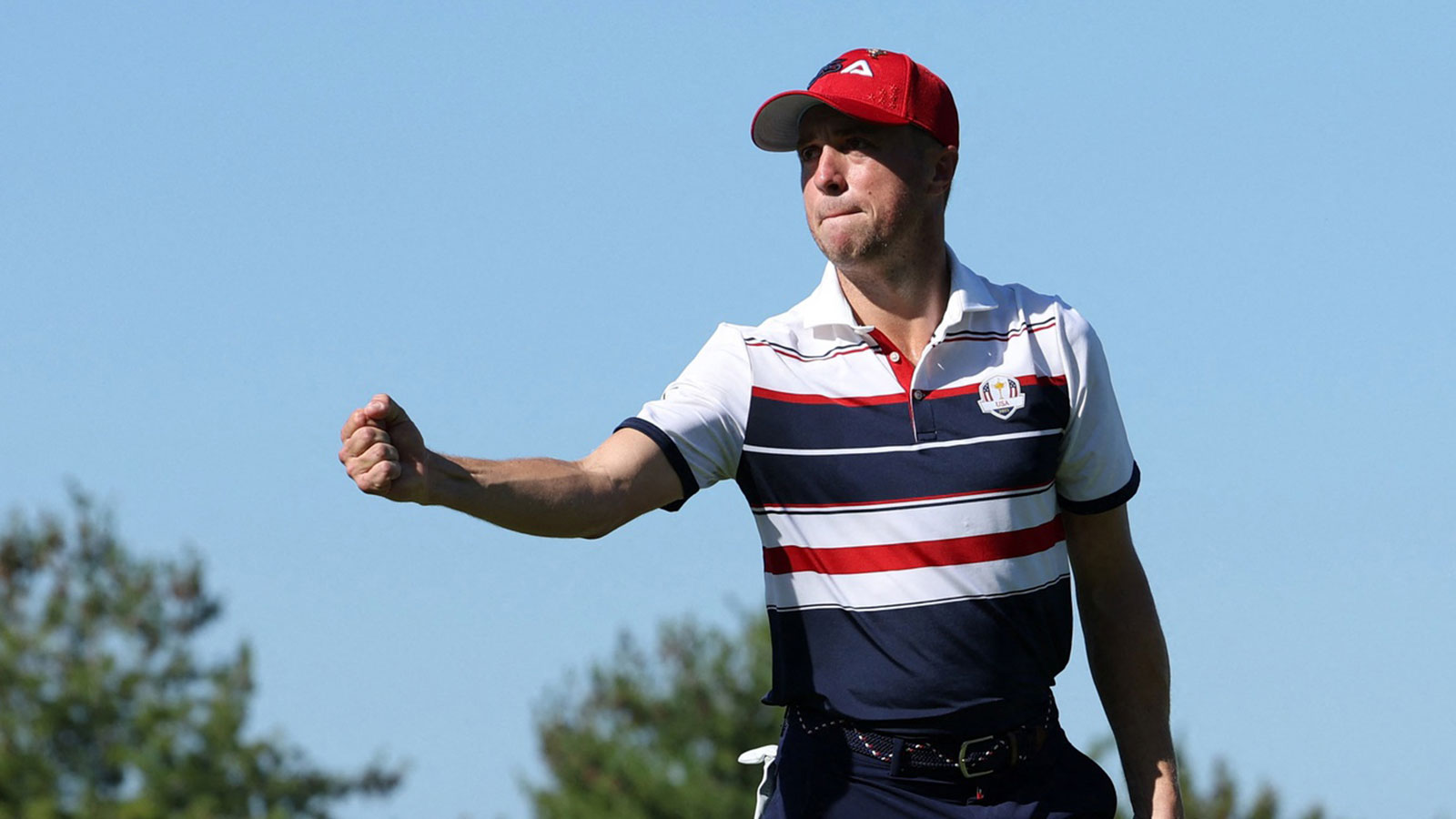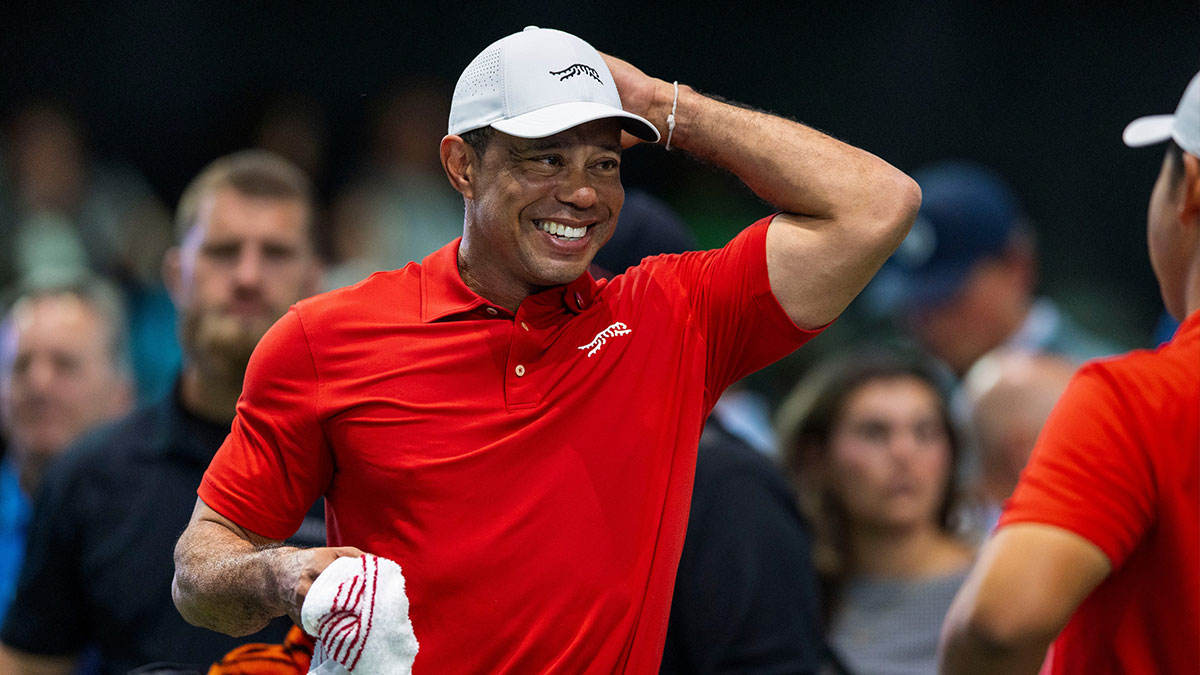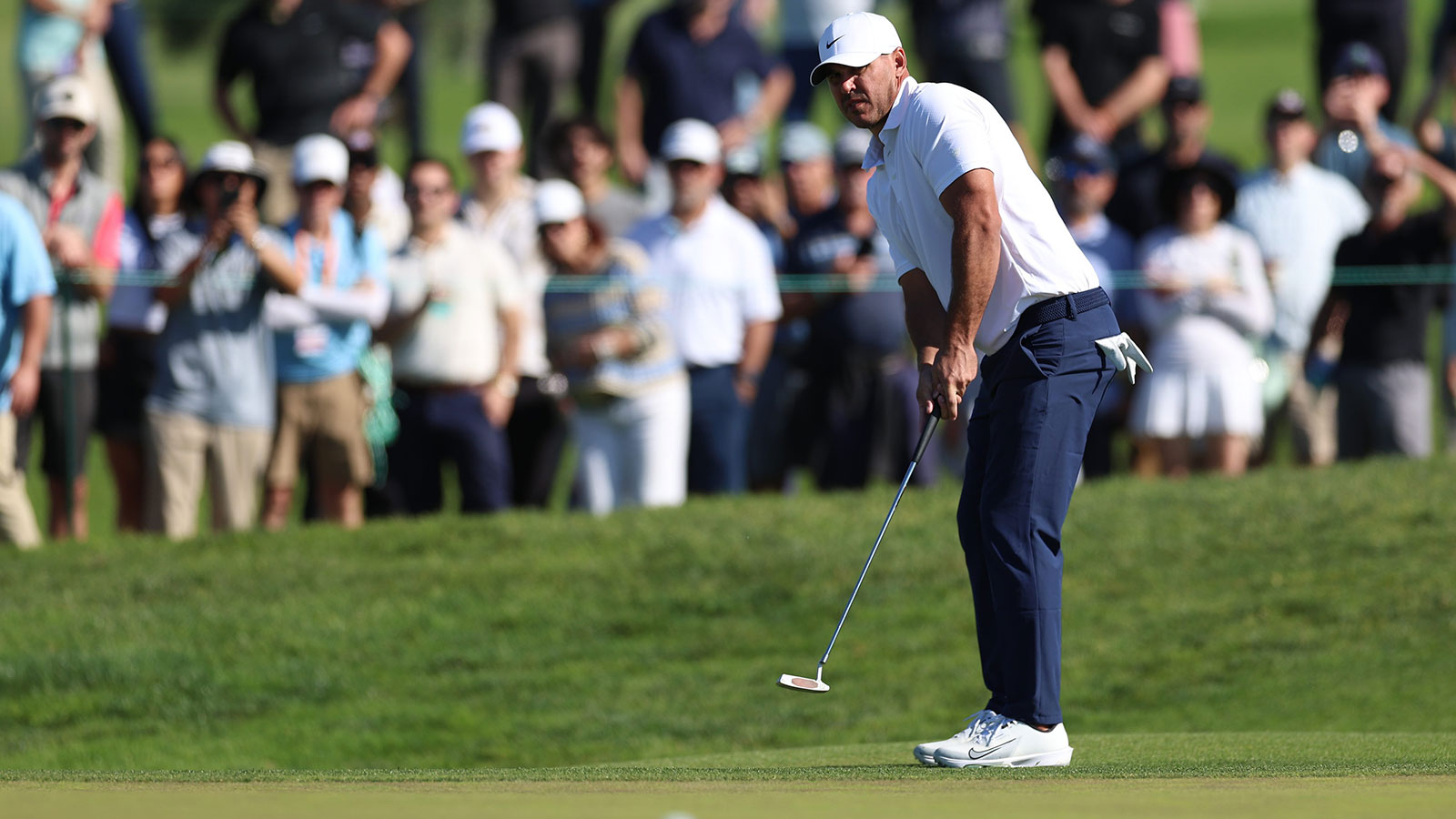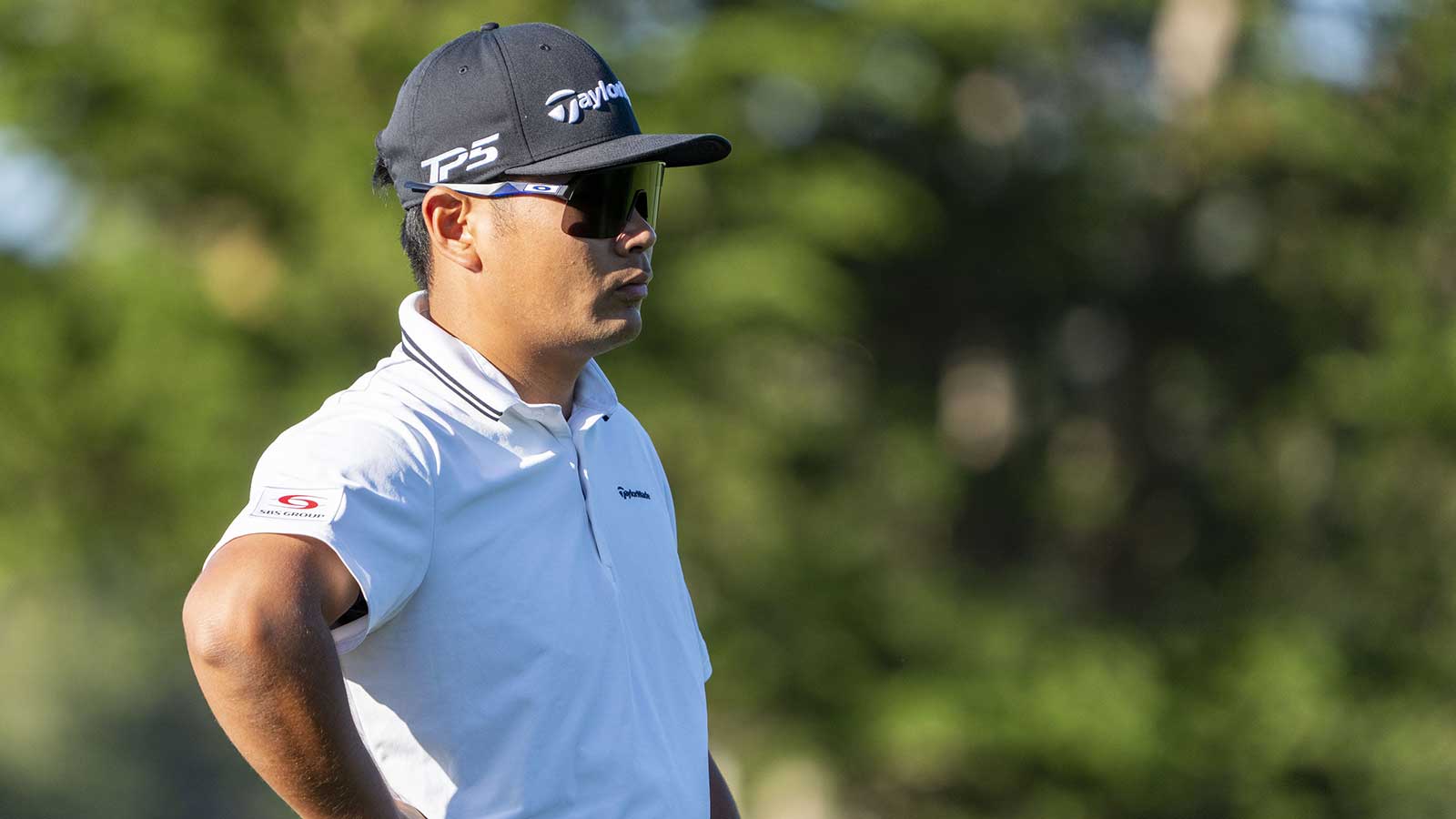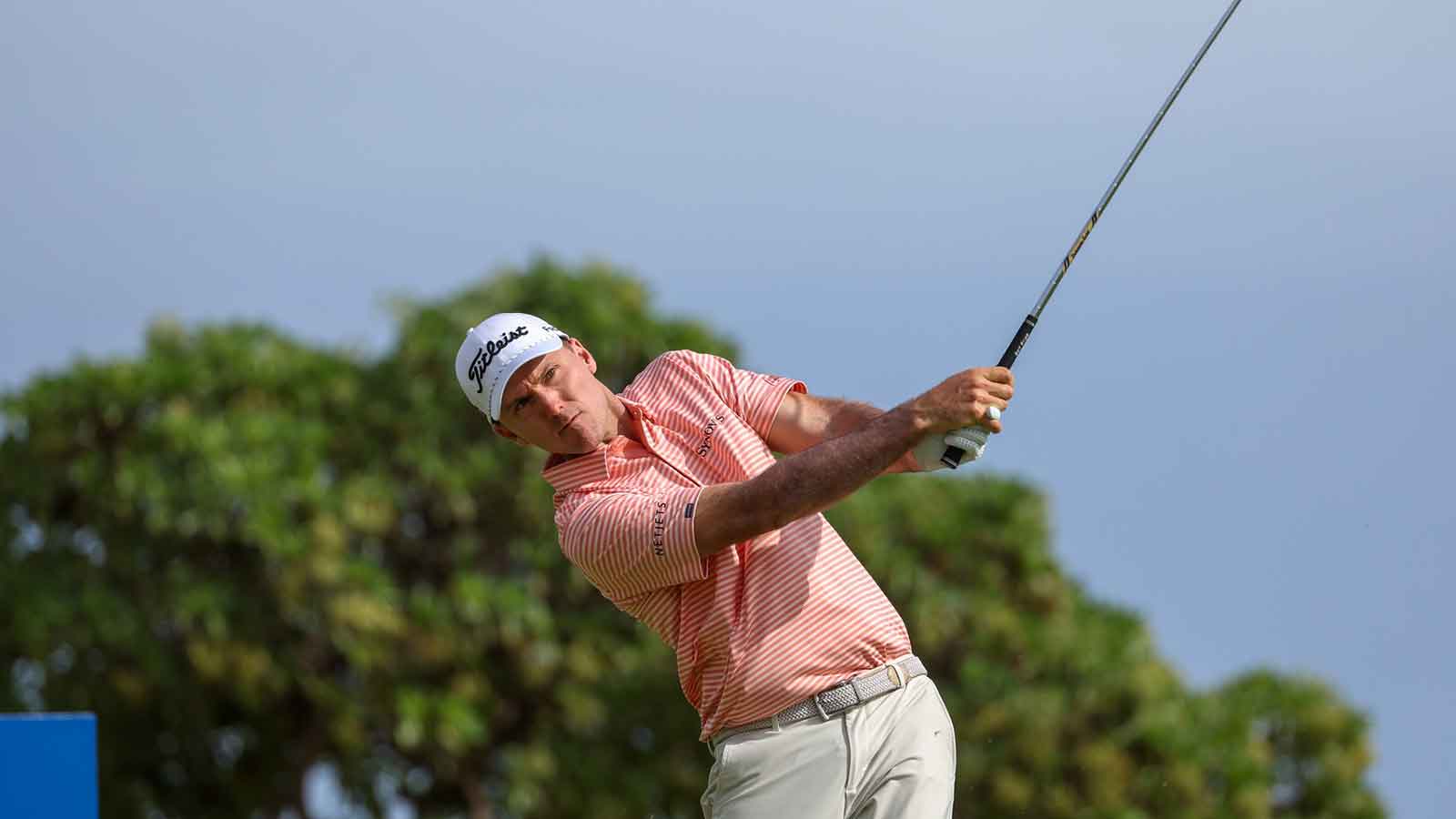On Tuesday, the golf landscape was tectonically shifted — maybe — by the stunning revelation that the PGA Tour plans to join forces with the DP World Tour and Public Investment Fund (PIF) — the Saudi-based sovereign wealth fund that backs the LIV Tour.
The “memorandum of understanding” — as Squawk on the Street host David Faber later described it — was announced on CNBC by PGA Tour commissioner Jay Monahan and PIF governor Yasir Al-Rumayyan. The accord has far-reaching ramifications across the realms of geopolitics, business, and sports. It also may not happen.
Curiously, Monahan and Al-Rumayyan went public with their partnership — nay, a “framework” of their partnership — without having anything sorted out. Instead of providing clarity on the future of golf, everybody with an interest in this development was left with far more questions than answers.
Three days later, nothing has changed, besides the fact that a PGA Tour event has teed off — the mood is reportedly “somber” — while momentum against the deal mounts.
After digesting an unceasing deluge of information, speculation, and takes, let's run through everything we don't know about the proposed peace treaty.
What would the new entity look like?
Rory McIlroy, who fielded questions Wednesday ahead of the RBC Canadian Open, noted that the arrangement was misconstrued as a “merger” — a word not used in the press release.
The parties involved have signed at least one piece of paper and agreed to combine “PIF's golf-related commercial businesses and rights (including LIV Golf) with the commercial businesses and rights of the PGA Tour and DP World Tour into a new, collectively owned, for-profit entity.”
The PGA Tour will remain a non-profit 501 (c)(6) organization. The new entity will be a for-profit enterprise.
What?
If all goes according to plan, beginning in 2024, PIF — which manages $700+ billion — will become the exclusive investor in the umbrella entity. The non-profit aspect of the PGA Tour will operate logistical elements like pensions and administrative duties (and continue to enjoy the tax-exempt status). The for-profit component will produce those nifty golf tournaments.
Al-Rumayyan told Faber that it'll take three (?) weeks to assess valuations for every asset involved and hammer out specifics. PIF will buy an equity stake before opening it up to private equity.
Who'll be in charge?
Monahan would be CEO and oversee the majority of worldwide professional golf, including LIV. Al-Rumayyan will be Chairman of the Board. The Tour will have controlling interest on the board, which will include PGA Tour Chairman Ed Herlihy and Jimmy Dunne — who joined the PGA Tour board in 2022 as a “new power broker” per GolfDigest (more on him later). As Monahan has stressed, the PGA Tour higher-ups will have control over golf operations and infinite capital at their disposal.
However, PIF has final cut over who else can invest. So, the fund might not control the board, but they control the cash. Ask Kendall Roy about having a board majority.
What will it be called?
My guess is that the LLC will have a corporate title as dull as “Public Investment Fund.” Maybe like: Global Golf Holdings, or World Golf, LLC.
When the umbrella tour manifests, it'll be called something like World Golf Tour. They could just call it the PGA Tour, though the “A” might not be as applicable.
Will LIV live?
It's possible that PIF used LIV to trojan horse its way into the golf space. LIV generated countless headlines and forced the PGA Tour into an existential crisis, yet lost $2 billion while failing to build more than a microscopic audience comprised of MAGA bros.
LIV's CEO, Phil Mickelson, Greg Norman — whose ouster Tiger Woods said was a prerequisite for a merger — was informed of the decision minutes before the CNBC hit. Naturally, that raised eyebrows about his future with the league, and LIV's fate in general. Was PIF going to cannibalize LIV as part of the new arrangement?
We'll see. On Thursday, a LIV official told ESPN that the league is “Yasir's baby” and any notion of dissolution is “ridiculous.” The Shark defiantly claimed that LIV's future is louder than ever.
“We know the big picture,” chomped Norman. “We don't know the details because this is the beginning of the (merger and acquisition) process. There's just a lot to be worked through in the coming weeks. I think a lot of our questions will be answered … but the big picture, LIV is not going anywhere … We are — and we will continue to be — a stand-alone entity. It is business as usual for us for this year and beyond.”
Update, via ESPN: “While Norman has told LIV Golf's staff members that the league was making plans for 2024 and beyond, others at the highest levels of the sport don't seem convinced that the LIV Golf League will survive beyond this year. Multiple sources have told ESPN that if there's a team concept in future seasons, it won't be in LIV Golf's present form and won't include Norman as its CEO and commissioner.”
Norman added this, in response to McIlroy saying that he still “hate(s)” LIV and hopes it “goes away.”
“Now we can finally get Hideki (Matsuyama) and Jon Rahm. I would say every big name on the PGA Tour will get an offer. Except Rory. Nobody wants that little b*tch on their team.”
Water under the bridge!
Who knew?
Seven weeks ago, Al-Rumayyan reportedly wooed Monahan — who spent 18 months vilifying Saudi money — after 10 minutes. They played golf, ate lunch (love a good productive lunch), looped one or two colleagues in, made a few calls, didn't spill the beans, and boom, possibly altered professional sports.
It's truly astounding that nobody leaked the conversations, though maybe it was prudent to keep it hush — golfers gossip, after all. (Mergers and acquisitions are frequently negotiated in secrecy and announced right before markets open.) In the “heated” meeting on Tuesday, Monahan explained to the players that because the deal is still in beta, it was better off staying private.
“Given the complexity of what we were dealing with, it’s not uncommon that the circle of information is very tight. The fact of the matter is that this was a shock to a lot of people because we were not in a position to share or explain, as we normally would, and that was really a result of the commitment we had made to maintaining confidentiality.What we’ve agreed to here is a framework agreement, and the binding elements are tied to the litigation.”
For conspiracy theorists (not me): It's not totally outlandish to wonder if McIlroy knew something. Since admitting that 12 months as Tour spokesperson had been “taxing“, he accepted a $3 million fine to skip the RBC Heritage in April, due to a personal matter. When he re-emerged at the PGA Championship in May, he conspicuously refrained from LIV criticism. Then, on Wednesday, he backed the proposed deal — though he did say he felt like a “sacrificial lamb” and was surprised when told about the announcement on Tuesday.
Meanwhile, Mickelson — who started this whole darn kerfuffle — apparently told Barstool's Dan Rapaport at the PGA Championship that he decided to get spicy on Twitter again because he knew about developments coming down the pike.
The players should be peeved, correct?
The PGA Tour players justifiably feel “betrayed“. Monahan banished LIV defectors from the Tour while emphasizing the morality angle. Rory, Tiger, Hideki, Rahm, Collin Morikawa, Max Homa, Rickie Fowler, and Will Zalatoris, among others, turned down tens/hundreds of millions and devoted time and energy to brainstorming counter-initiatives while carrying Monahan's water as public advocates for the Tour.
Then, they checked Twitter and found out they were pawns.
Nothing like finding out through Twitter that we’re merging with a tour that we said we’d never do that with.
— Mackenzie Hughes (@MacHughesGolf) June 6, 2023
I’ve grown up being a fan of the 4 Aces. Maybe one day I get to play for them on the PGA Tour!
— Joel Dahmen (@Joel_Dahmen) June 6, 2023
Was having quite the nice practice session this morning too pic.twitter.com/qWBKuM2yHO
— Justin Thomas (@JustinThomas34) June 6, 2023
Unsurprisingly, LIV golfers — and Donald Trump — were pleased. They're gonna get their cake and eat it, although, ironically, the faux-merger may foreshadow the downfall of their rogue enterprise.
How did the PGA Tour get here?
In the words of TV executive Don Ohlmeyer: The answer to all of your questions is money.
Once the Saudis identified golf as part of their Vision 2030 plan to boost their public image in the West and diversify their portfolio, the pressure was on. Because golf is a global sport populated by individual contractors and governed by myriad bodies, it was duck on the pond for PIF.
In 2021, Mickelson clumsily posited that, despite Saudi Arabia's heinous human rights record, their interest in golf could be leveraged against the PGA Tour. LIV, to many people's surprise, actually happened. It recruited top players and introduced features like team play — featuring investable franchises with super-rad names like the HyFlyers and Crushers — and 54-hole, no-cut events. Shorts were allowed. The Chainsmokers performed. The results were not recognized by the World Golf Rankings. There were absolutely zero stakes.
In response, the PGA Tour called all-hands-on-deck meetings, instituted significant schedule and rule changes, and dramatically increased purses. Rory and Tiger quickly formed a company, TGL, to produce tech-driven, arena-based showcases. (On Thursday, TGL sold its first team, to Serena Williams.)
By all accounts, the bills started piling up. The Tour was starting to squeeze sponsors, resulting in dropouts like AT&T and Honda. (BTW, Monahan recently nixed a deal with Raytheon to replace AT&T as the Bryon Nelson title sponsor because Raytheon sells military equipment to Saudi Arabia. Welp.)
And the lawsuits?
Like the wind at Shinnecock Hills, litigation is very much a factor.
The overall deal is all about business, but the PGA vs. LIV beef got deeply personal. After Monahan's ban, the LIV fellas sued the PGA Tour for antitrust violations. The PGA countersued. Nobody was happy, other than the lawyers.
No Laying Up's Tron Carter heard the PGA Tour was spending $30-50 million on legal fees. On the flip side, the PGA Tour's lawsuit may have led to MBS being deposed. Neither side was eager to part-take in a discovery phase. The suits would have dragged on for months, maybe years. Now, all those lawsuits are null. But…
Could antitrust inquiries derail everything?
The U.S. Department of Justice is already investigating the PGA Tour for antitrust regulations and the tours just … created a monopoly?
On CNBC, Monahan expressed confidence that the deal will overcome regulatory scrutiny because the individual contractors will benefit from the improved state of competition. Uh-huh.
“The DOJ is now going to have to study the implications of the quote-unquote, merger, to determine whether or not it’s anti-competitive,” a sports antitrust attorney told The Athletic. “They could seek to block, on the grounds that it is anti-competitive. So obviously, it’s anti-competitive, they’re getting rid of a competitor.”
(I haven't passed the bar, but “merger” being excluded from the announcement seems noteworthy.)
Did Al-Rumayyan and Monahan announce a half-baked deal to buy time to gather intel and complete the framework in the most favorable eyes of the DOJ? Either way, Capitol Hill's interest is piqued. A Democrat representative from California has already proposed a bill to strip the PGA Tour of its tax exemption should a deal go through. Other politicians have voiced concern over the Saudi government taking over an American-based enterprise.
Furthermore, due to the DP's involvement, Europe's antiregulatory overseers have to approve the deal, too (as well as the PGA Policy Board, which includes Herlihy, Dunne, and five players, including Rory).
According to golf podcaster, brother of PGA member Mark Hubbard, and plugged-in businessman Nathan Hubbard, there is a genuine possibility that the deal is nixed.
1)After 48 hrs talking to much smarter people inside and outside of DC, London, and Brussels, I’ve heard enough to believe:
The PGA Tour-LIV deal will be blocked. The filings in the prior lawsuits between them are damning.
If so, let’s ask the *next* questions:
— Nathan Hubbard (@NathanCHubbard) June 8, 2023
Could the Saudi influence have been avoided?
Arguably, the lone opportunity to keep Saudi money out of the PGA Tour came last year, when the upstart Premier Golf League (PGL) approached the Tour about opening the door for private equity investing and collaborating on alternatives to LIV. Monahan didn't take the meeting. (Maybe they could have done the half-non-profit/for-profit thing then?)
But even if Monahan had shared a Johnnie Walker with PGL reps, the PIF could've eventually nudged its way in.
“I've come to terms with it,” Rory said about the Saudi influence. “I've resigned myself to … this is what's going to happen. It's very hard to keep up with people who have more money than anyone else.”
What might the schedule look like?
If it all goes through, expect the 2024 PGA Tour calendar, which will be released soon, to resemble what's been proposed, including an uptick in elevated events.
Monahan told CNBC he “can't envision” LIV-style team events infiltrating the PGA Tour, but the press release did say that they'll look into how “best to integrate team golf into the professional game.”
It's possible that the existing tours continue to operate status quo, with crossover events sprinkled in. Ideally, these events would not just fill in gaps in the schedule but also boost interest in lesser PGA Tour tournaments. Beyond 2024? Who knows.
A few of the LIV teams represent specific countries (i.e. U.S., Spain, South Africa) which could open the door to mini-Ryder Cup-style matchups.
What is the hypocritical handicap of the Monahan & Dunne pairing, if par is 72?
They're about 50 over.
Pretty much every time the commish opened his mouth since LIV formed, he played the blood money card. Precisely one year ago, prior to the '22 RBC Canadian Open, Monahan noted that PGA Tour players wouldn't have to “apologize” for driving and putting for a government that may have perpetrated 9/11.
"Have you ever had to apologize for being a member of the PGA Tour?”
PGA Tour Commissioner Jay Monahan comments on players joining LIV Golf. pic.twitter.com/MeHAbR1qQL
— TSN (@TSN_Sports) June 12, 2022
“I recognize that people are going to call me a hypocrite,” Monahan said Tuesday. “Anytime I've said anything, I've said it with the information I've had at the moment, and I've said it as someone who was trying to compete for the PGA Tour and our players. I accept those criticisms, but circumstances do change. Looking at the big picture and looking at it this way, that's what got us to this point.”
In an interview on Golf Channel, Jay Monahan stumbles though an attempt to defend his hypocrisy regarding the use of 9/11 families as a talking point against LIV Golf. pic.twitter.com/6blmZd8kDg
— Awful Announcing (@awfulannouncing) June 7, 2023
I thought nobody involved in this brouhaha would speak more embarrassingly about the 9/11 ties than Bryson DeChambeau, but Dunne out-drove him.
Businessman Jimmy Dunne, who helped put together the PGA Tour-LIV deal, lost 66 of his colleagues on 9/11:
"The people I'm dealing with had nothing to do with it… if someone can find someone that unequivocally was involved with it I'll kill them myself." pic.twitter.com/kjMIn7tROH
— Awful Announcing (@awfulannouncing) June 8, 2023
Will LIV dudes rejoin the PGA Tour?
It's hard to imagine this deal striking without an intent to re-ingratiate LIV players — including Brooks Koepka, the 2023 PGA Championship winner — onto the Tour.
“There still has to be consequences to actions,” said McIlroy. “The people that left the PGA Tour irreparably harmed this tour, started litigation against it. Like, we can't just welcome them back in. That's not going to happen.”
Per the framework, LIV players can re-apply for Tour membership after 2023. Monahan called it a “complicated endeavor and one that will be guided by established PGA Tour rules and regulations.” It's reasonable to expect some kind of reinstatement fee.
Here's what the Fire Pit Collective's Alan Shipnuck — currently authoring a book on LIV — wrote:
“Keeping LIV going solves a few problems: The players could be denied full PGA Tour membership, which would prevent them from playing in the FedEx Cup playoffs or enjoying the Tour’s famously generous retirement program. This would give McIlroy (and many of his colleagues) a measure of the retribution they crave. But the LIV players could be allowed to accept sponsor’s exemptions into their favorite Tour events—the maximum is seven per season for non-members—helping those tournaments attract more stars and further reunify the game. And Tour members being able to moonlight at some LIV events would give them access to the bloated purses, which would certainly smooth over some of the hard feelings.”
Will the players get their money?
I could not care less care about this, but, should LIV eventually fold, how the players get paid out will be a pressing issue. Mickelson (who signed for a reported $200 million), Dustin Johnson ($150 million), DeChambeau ($125 million), and Koepka ($100 million), among others, signed multi-year deals, though the contracts were negotiated on an individual basis. Nobody knows the details.
As for the loyalists, there will be gobs of money pouring into golf and plenty of opportunities for the hangers-on to profit. According to Dunne, those players who stuck with the Tour will receive an equity stake in the new venture. LIV defectors will not.
What about the rank-and-file?
The mid-tier PGA Tour members (the “mules”, as they say) may see more money in the long run — especially if they play well — but it won't make up for the money they might've passed up (see: Branden Grace's $43 million in earnings at LIV.)
🚨#NEW: Chesson Hadley tells the media that he would like to be rewarded for his loyalty to the PGA TOUR pic.twitter.com/rDJjUguLIn
— NUCLR GOLF (@NUCLRGOLF) June 8, 2023
The '23 RBC Heritage Open features only one top-20 player: Rory, the two-time defending champion (RBC is a long-time sponsor of the PGA Tour with past business ties to Aramco). The vast majority of the players physically present in Toronto for Monahan's meeting were mules.
🚨👀 Grayson Murray called for Commissioner Monahan to resign at the players meeting yesterday. Rory McIlroy responded saying “Play Better” and was met with a “F—k off” by Murray. 😅 @TrackingRory
(Reported earlier by @acaseofthegolf1) pic.twitter.com/mYJV4HwefX
— NUCLR GOLF (@NUCLRGOLF) June 7, 2023
Based on the new regulations, players who finished inside the Top 70 in the FedEx standings earn Tour cards for the following year. What happens if the LIV guys are back in the fold?
“I think the future of the PGA Tour flooks brighter, as an entity,” said Rory. “What that looks for players in terms of keeping a PGA Tour card … that’s where the anger comes from.”
The money flooding into the sport should benefit everybody. But, the non-marquee names may have to enter more events overseas, perhaps via the DP World Tour. (Hopefully, lower-level tournaments will be propped up thanks to the influx of capital.)
What happens to the majors and Ryder/Presidents Cup?
The four majors — the sport's centers of gravity — should remain unchanged. Their prestige and meaning to fans and players are grandfathered in. They're operated by individual bodies that are not the PGA Tour (the heads of each body publicly backed the impending shake-up).
Plus, as Shipnuck pointed out — the media deems what and what isn't a major. They won't be fooled just because, say, PIF pours hundreds of millions into a splashy event. The PGA Tour has tried this with The Players Championship, to no avail. In fact, the money that would flood into golf should trickle down to the majors.
The Ryder and Presidents Cup thing could get interesting. Because of ongoing litigation between LIV defectors from DP, certain players — Sergio Garcia, Ian Poulter, Lee Westwood, Paul Casey, and Henrik Stenson — are ineligible for the festivities this September in Rome. American LIV players with membership to the PGA of America (different than the PGA Tour) can compete if selected by captain Zach Johnson.
PIF could try to purchase a governing body of a major — the USGA, the PGA of America, the R&A — or the Ryder or President's Cup.
So, Phil was right?
I'll let the CBS' Kyle Porter sum this up:
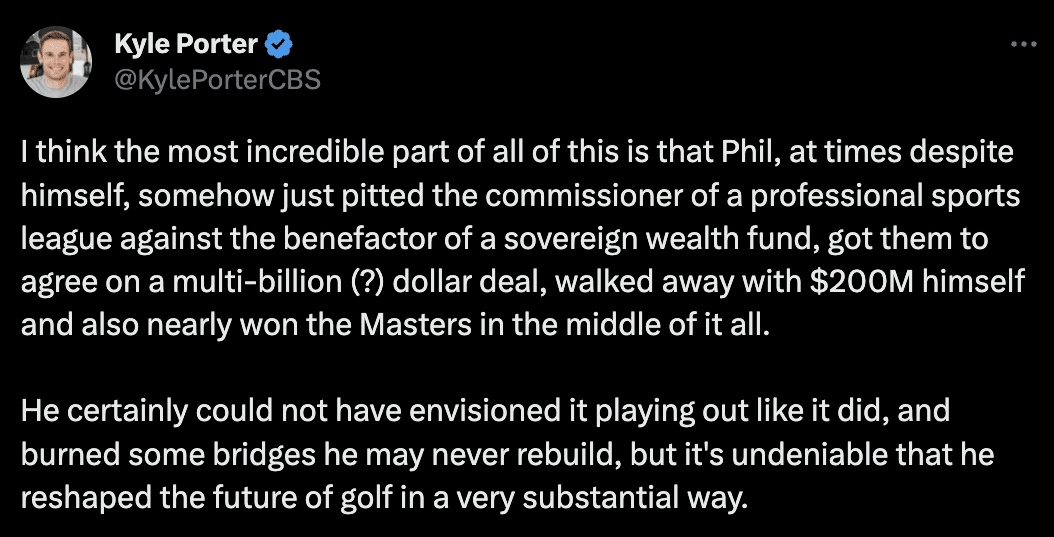
Awesome day today 😊 https://t.co/qUwVJiydym
— Phil Mickelson (@PhilMickelson) June 6, 2023
What's Tiger Woods' role in all of this?
It's unclear how this affects Tiger, who has yet to comment on the matter. He publicly despises LIV — he reportedly turned down $800 million to join and respects PGA lore as much as anybody — but he doesn't have the active presence nor the leverage in these matters as he once did, since his playing career is basically kaput. His voice carries weight, but he's just not around all that much.
Theoretically, once all the valuations are completed, the new entity could gauge Tiger's interest in a majority stake in a franchise, or some other role/investment. He'll have the TGL venture and intends to play the majors, at least.
Rory took the high road?
Rory could have gone scorched earth on Monahan and possibly ended his reign. He didn't.
“I do,” McIlroy said when asked if he maintains confidence in Monahan. “And, look, I've dealt with Jay a lot closer than a lot of those guys have.”
McIlroy placed long-term realities above short-term outrage.
“All I’ve wanted in the past year is to protect the future of the PGA Tour and protect the aspirational nature of what the PGA Tour stands for, and I hope that this does that. Whether you like it or not, the PIF were going to keep spending money in golf. At least the PGA Tour now controls how that money is spent.
“So, if you’re thinking about one of the biggest sovereign wealth funds in the world, would you rather have them as a partner or an enemy? At the end of the day, money talks, and you’d rather have them as a partner.”
So, is Monahan gone?
For now, it seems, he's not only safe; he orchestrated a promotion. Funny how that works.
Is this the first domino to fall?
Saudi money is increasingly ubiquitous in Western sports and business. They're already involved with the WWE, Formula 1, Premier League soccer, etc. The NBA allows funds to purchase minority stakes in teams, as Adam Silver reiterated on Thursday, just in case PIF is interested.
If the deal goes through, it would mark the first time that a foreign nation's sovereign fund directly partnered with a major American sports league. What's next? Will they sponsor NIL money? The NFL currently bars sovereign wealth funds from buying ownership stakes, but all it apparently takes is a quality 18 and a hearty lunch to change things.
(Of course, if you call an Uber, fill up at Shell, play Call of Duty or Madden, drive a Ford, get a Pfizer shot, stay at a Marriott, fly on a Boeing, watch a Disney movie, transfer money via PayPal, order a pumpkin spice latte at Starbucks or a Coke, Google something, scroll Facebook or hop on a Zoom call, you're using a Saudi-invested product. U.S. Secretary of State Anthony Blinken spent this week in Riyadh meeting with MBS and celebrating a new embassy.)
All that said, is this good for golf?
Yes.
Morality aside, there's a stable, highly motivated financial support system backing global golf with bottomless risk capital. The media rights deals will be unprecedented for the sport. There will be more events, of all different kinds, in all different places. Golf won't be divided and overwhelmed by litigation.
Monahan repeatedly using the phrase “growing the game” this week to describe their motives — the precise phrase he, and everybody else, mocked LIV defectors for deploying instead of “we got paid more” — is hilariously embarrassing. Hopefully, he actually means it, because he has an opportunity to genuinely do so.
In their joint statement, PIF and the PGA Tour said they would “implement a plan to grow these combined commercial businesses, drive greater fan engagement and accelerate growth initiatives already underway.”
As long as this doesn't result in players being forced to shamelessly promote Saudi propaganda, this is a good thing for golf fans, if they can get past the moral complexities. That's up to each individual.
Lingering questions:
- How will this impact developmental pipelines? Ideally, this partnership should create academies, initiatives, etc. in more places than ever.
- What about the other tours operated by the PGA Tour: the Champions Tour, the Korn Ferry Tour, PGA Tour Latinoamérica, PGA Tour Canada?
- Will the LPGA Tour follow suit? Cooperation could help close the purse gap. There’s already a lucrative Aramco (yes, Aramco) Team Series Tour that resembles LIV. LPGA commissioner Mollie Marcoux Samaan supports the proposal.
- How will it affect the legacies of players — those who went to LIV and others who just experienced this paradigm shift in golf?
- Less important, but will the proposed rollback changes be … rolled back? Would love to hear the Crown Prince's take on this.
- What did Monahan personally pocket from PIF?
In conclusion, to quote the legendary screenwriter William Goldman: Nobody knows anything. Well, at least we know the Netflix cameras were rolling.









